Medical Miracles on 34th Street: Perelman School of Medicine
A Close Call with COVID-19 Ends in a Presby Proposal
“Funny” was the word 68-year old Robert Calandra first used when describing the symptoms that would eventually lead to a COVID-19 diagnosis. But soon, “funny” turned to “odd,” which turned to “very, very wrong.” The Ambler resident is a talented writer whose work has appeared in books, magazines, and newspapers, but he never expected that his own life would become the story.
He felt fine while playing ice hockey one day in early March, but by the following day, his temperature began inching up, and he felt increasingly tired and listless. “I actually went into my office and pulled out my will and medical power of attorney, wrote some notes, signed them, and left them prominently on my desk. I just had a feeling that something bad was happening,” he said. “From there, it spiraled.”
At the encouragement of his primary care physician and friend Michael Cirigliano, a Penn Medicine internist, Mr. Calandra visited the drive-through coronavirus testing site in Radnor. But his longtime girlfriend Monica Hamill soon needed to call Dr. Cirigliano again—Mr. Calandra’s temperature had jumped to 102.5 degrees, and he was so weak that he could barely sit up, even with Ms. Hamill’s help. Cautioning Ms. Hamill to stay at home to contain the virus in case she was also infected, Dr. Cirigliano recommended that Mr. Calandra’s daughter, Lindsey Calandra, a nurse practitioner at Children’s Hospital of Philadelphia, go out and purchase a pulse oximeter for her father. If it showed his oxygen level was under 90 percent, they needed to go to the emergency room immediately. Mr. Calandra’s reading was a dangerously low 80 percent.

“I was pretty out of it, but I did tell them that Penn Presby was the only place I wanted to go,” Mr. Calandra said, explaining that he had previously received exceptional care at PPMC when he experienced septic shock. “Monica bundled me into the car, and from there, I remember flashes—parts of the car ride, being helped into a wheelchair, arriving in the isolation room,” he recalled. “My last clear memory is of the doctor telling me I needed to be intubated immediately. And then... I began my magical mystery tour.”
For Ms. Hamill and Lindsey Calandra, the next several days were harrowing. Because they could not visit the hospital due to COVID-19 precautions, Lindsey Calandra established contact with his care team and regularly received a roller coaster of updates. Mr. Calandra was initially described as “very sick,” then seemed to be pulling through, only to suddenly become unstable again.
But the experience was very different for Mr. Calandra. While he was unconscious for most of his 13 days on a ventilator, he remembers a series of incredibly vivid dreams, some of which corresponded with his condition. “I was a 19th century ship’s captain for a while, and I remember having a ponytail and wearing a short green jacket and silk stockings,” he said. But when his blood pressure dropped and his fever spiked to 103 degrees, his dream state shifted to “a devilishly hot day in Atlantic City. I just kept saying, ‘We gotta cool off.’ I think that was the night they were putting ice packs around me to bring my temperature down.”
With an incredible care team on his side, Mr. Calandra steadily began to improve. Infectious disease expert William Short reached out to Lindsey Calandra about a clinical trial he was leading investigating the effectiveness of an antiviral drug, Remdesivir, in treating COVID-19, and she agreed to enroll her father. A few days passed, during which a foggy Mr. Calandra had FaceTime conversations with both his girlfriend and daughter that he does not remember, mistook Dr. Short for actor James Earl Jones, and, after being extubated, reveled in the perfection of the “gourmet meals from the gods”—applesauce and pudding.
But there was one thing that Mr. Calandra was not foggy about at all, and he shared it during his next phone call with Ms. Hamill. “Monica and I have been together for eight years. As I was laying there, I kept thinking that life is the blink of an eye—and I just blinked several times over 13 days,” he said. Indeed, not only had he faced a life-threatening illness, but during his hospitalization, Ms. Hamill’s father also passed away. “It was time to move things forward. So… I asked her to marry me. She was stunned, but eventually said yes! And it had nothing to do with the ICU drugs!”
“Amidst the chaos that COVID-19 has brought into our lives, it has also forced us to reflect on what’s truly important and to find ways to connect,” recalled internist Rani Nandiwada. “When our team met with Robert in the ICU, we told him that the gossip mill said he might be engaged. He laughed and told us that after everything he’d been through, he hit the point ‘where you just gotta do it.’ He made our day and brought so much happiness just by sharing his joyful moment.”

After transitioning to the step-down unit, Mr. Calandra was finally discharged—nearly 30 pounds lighter, but alive and on the road to recovery. For the last several weeks, he has been working with Penn Medicine at home diligently via telemedicine, noting that he “can’t say enough good things” about occupational therapist Marisa Hart and physical therapist Sarah Penning.
“They’ve been fantastic. I came home on a walker, and now I’m walking on my own—still a bit shaky, but doing better than anyone expected.” The compliments extend to everyone who cared for him during his battle against COVID-19. “I tell everybody, ‘If you’re sick, you need to go to Presby,’” he said. “I’ve received nothing but great care. They saved my life.”
Thanks to the tireless efforts of PPMC’s doctors, residents, nurses, and respiratory therapists, Mr. Calandra has been able to put his will and medical documents away. Instead, his desk will soon be piled up with manuscripts detailing his story, song lyrics about his experience to share with his bandmates, and plans for the future.
This article was originally published in Penn Medicine News.
How a New York Times Medical Mystery—and a Determined Sister—Saved This Patient’s Life
It started with a cough. In the fall of 2019, months before a tickle in the throat would send anyone into COVID-19 panic, Susan Bosanko, 59, was unalarmed.
“I initially thought it was probably just allergies. It would come and go. I didn’t want to go to the doctor, because I’d be coughing really bad one day, and the next few days, I’d be fine,” said Ms. Bosanko, an insurance claims examiner who lives in Albany, New York.
Then, she started to cough up the “awful things”—soft, rubbery, branch-like structures, which she said resembled “baby umbilical cords.”
Ms. Bosanko, a former smoker, was accustomed to bouts of bronchitis. But she had quit the habit five years earlier, so the coughing seemed unusual. She was also dealing with other—seemingly more urgent—health issues, like lumps in her neck and her breast, and so, she decided to try her best to ignore the strange symptoms.
By December, her cough intensified, and she went to the doctor, bringing with her pictures of the foreign objects that had projected from her lungs. She was sent home with oral steroids and a nebulizer.

Finally, in February, a work colleague brought her an oximeter to measure her blood oxygen levels. The reading said 80 percent—the point at which a person’s vital organs are in danger. She called her primary care doctor’s office and told a nurse about her reading over the phone. “That’s impossible,” the nurse said. A few hours later, an ambulance was transporting Ms. Bosanko to St. Peter’s Hospital in Albany, where she was intubated and placed on a ventilator.
As Ms. Bosanko’s sister Marion Groetch would later understand, the lymphatic system is a network of tissues and organs that help rid the body of toxins. Its primary function is to transport lymph, a fluid containing infection-fighting white blood cells, throughout the body’s vessels. Most often in children, but sometimes in adult patients, something goes awry and that lymph fluid leaks from the thoracic duct into the lungs, where it hardens into casts that replicate the shape of the bronchial tree—a hallmark of plastic bronchitis. The “umbilical cords” that Ms. Brosanko had been coughing up for months? They were actually fluid molds of her own airways.
No one at St. Peter’s specialized in treating the rare disorder. The medical team’s main goal was to stabilize Ms. Bosanko. The untreated plastic bronchitis was causing acute respiratory distress.
“At one point, they had removed 400 mL of fluid from her lungs. I was scared to go into her room. I started thinking, ‘What if this doesn’t work?’”
For two weeks in the Intensive Care Unit, the team worked around the clock to stabilize Ms. Bosanko, with bronchoscopies, proning, oxygen therapy, and careful titrating of medications. That same week, The New York Times happened to publish a “Diagnosis” column, about a 65-year-old man with a relentless cough and shortness of breath. One of Ms. Groetch’s neighbors sent her the article.
The columnist, Lisa Sanders, reported that the cause of the man’s symptoms was an abnormal flow of lymph fluid into the lung, where it hardens to form casts that obstruct the exchange of oxygen. Ms. Groetch read, with interest and hope, about a team of interventional radiologists at Penn Medicine who had developed a way to visualize and repair the abnormal lymphatic flow.
Ms. Groetch and Ms. Bosanko’s extended family and friends searched on PubMed for studies authored by the doctor who had saved the man’s life: Maxim Itkin, a professor of radiology at the Perelman School of Medicine. They quickly came to realize that Dr. Itkin is one of the top doctors in the world specializing in the treatment of lymphatic disorders. Immediately, Ms. Groetch called Penn and connected with Dr. Itkin’s assistant.
“Can you have your sister’s doctor call him in the next 10 minutes?” the assistant asked her.
Ms. Bosanko’s doctor was not working that day, but she happened to be stopping by the hospital for a visit when Ms. Groetch called St. Peter’s. The doctor spoke with Dr. Itkin and consulted with Ms. Groetch and Ms. Bosanko’s boyfriend, Matt Magin. The group decided that it would be in Ms. Bosanko’s best interest for Dr. Itkin to treat her himself.
Soon after, Ms. Bosanko arrived by helicopter at the Hospital of the University of Pennsylvania.
“I’ve done this procedure 1,000 times,” said the interventional radiologist.
But if not for a discovery that Dr. Itkin himself helped to make nearly a decade ago, plastic bronchitis could still be a death sentence.
As far as researchers know, an abnormal lymphatic system is a condition that people are born with, and it often does not cause major medical problems. Doctors see it most commonly in children who have undergone a Fontan operation for congenital heart disease. But for adults like Ms. Bosanko, symptoms can appear out of the blue much later in life. For others, like the patient featured in The New York Times column, the coughing can go undiagnosed for years.
“It’s like a faucet that opens up, and it starts to leak,” he said. “Eventually the lymph leaks into the bronchial tree, and it gets harder and harder, until that fluid turns into casts—like an egg white that’s become dry.”
Dr. Itkin became interested in the lymphatic system while a medical resident in Israel, after he read a paper by Constantin “Stan” Cope. Dr. Itkin eventually ended up as a fellow at HUP, where
Dr. Cope serendipitously was on the faculty.
Dr. Cope became Dr. Itkin’s mentor, and then Dr. Itkin and colleagues later went on to make even greater improvements in lymphatic imaging, making treating cases like Ms. Bosanko’s a breeze.
When Ms. Bosanko arrived at HUP, she was too sick for an MRI, so Dr. Itkin began right away with the two-hour procedure to fix her lungs—called a thoracic duct embolization. During the minimally invasive procedure, Dr. Itkin first inserted a catheter into Ms. Bosanko’s thoracic duct and injected X-ray dye in order to identify the leak. To further confirm the leakage, Anthony R. Lanfranco, an assistant professor of pulmonary medicine, performed a technique called “blue bronchoscopy,” in which a special blue dye is injected into the patient while a pulmonologist looks at the airways through a thin, lighted tube, called a bronchoscope. Then, using a special glue, Dr. Itkin was able to close the thoracic duct and block the flow of lymphatic fluid that was leaking into her lungs.
“She’s fine. I fixed it,” Dr. Itkin said to Ms. Bosanko’s family as he entered the waiting room where they were pacing anxiously. Ms. Groetch hugged the doctor. Ms. Bosanko’s boyfriend burst into tears.

Ms. Bosanko stayed in the hospital for two more weeks. In the months since the procedure, she has experienced some uphill battles, but her breathing is back to normal. She returned to her office job in May.
After her sister’s recovery, Ms. Groetch wrote to Lisa Sanders at The New York Times, thanking Dr. Sanders, Dr. Itkin, and Ms. Bosanko’s medical team in New York.
“I think about what they are all going through now during this global pandemic, how hard they work to ensure the best outcome for every patient, and how painful it must be for them to be fighting for so many patients who are just not recovering,” her email read. “Because I witnessed how much they really care. I want them to know, and I want you and Dr. Itkin to know, that there is one 59-year-old woman who is alive today because of you.”
This article was originally published in Penn Medicine News.
Penn’s Gargoyles: Genial Gothic Gremlins
Penn has a varied enough selection of notable architecture from the last 150 years that certain sub-genres of it have slipped under the radar of most modern photographers and history buffs. Such is the case with Penn’s selection of gargoyles, which adorn the exteriors of nearly 20 buildings on campus.
Penn’s gargoyles are actually bosses, uncut stones placed on outer edges of buildings to be carved into ornamental forms. (The word “gargoyles” originates from the French word “gargouille,” meaning “throat”; literal gargoyles serve as building gutters or downspouts. Bosses, meanwhile, serve a purely ornamental purpose.) Bossage (the art of carving these ornamental figures) came into being in the thirteenth century as an artistic device to conceal unevenly-laid stone; in the sixteenth century, bosses became an artistic hallmark of Elizabethan architecture. Bosses are also known as grotesques, named after figures found in ancient Roman cellars and grottoes.
In the 1890s and the first couple decades of the twentieth century, Penn engaged Philadelphia architects Cope and Stewardson to design several University buildings. With their design for the Quadrangle, whose first section opened in 1896, Cope and Stewardson emulated several vintage eras of English architecture in a style that became known as Collegiate Gothic. In a delightful homage to Elizabethan architecture, they incorporated several dozen bosses into their design. They worked with sculptors Henry Plasschaert and John Joseph Borie (a Penn architecture alumnus) and stone carvers Edmund Wright, Edward Maene and assistants to turn these uncut stones into sculpted figures. Cope and Stewardson approved elevation views and clay models of each proposed boss, which was then carved over a period of three to four days from a fourteen-inch square piece of Indiana limestone that had been incorporated into the Quadrangle.
Mr. Plasschaert and his carvers kept the mood of these bosses whimsical. Parodic figures are abundant, such as a grotesque animal biting the corner of a block of stone, or an architect dressed in an elf costume carrying a basket of fruit. A variety of mythical creatures and bizarre monsters are on display, as is the occasional reference to academic activity, like the creatures brandishing tragedy and comedy masks atop the Mask and Wig clubhouse, or a monkey clutching a scroll labeled “diploma.” Many bosses don mortarboard caps or carry shields in a reference to campus life. Others refer to classical sculptures or fairy tales. As the Quadrangle continued to be expanded, its architects continued to add bosses, though sections built after 1928 abandoned the tradition.
While the Quadrangle has the most concentrated usage of bosses on campus, it is by no means the only place on campus they can be found. As early as 1888, Frank Furness had incorporated gargoyle-like appendages into his design for the University Library (now the Fisher Fine Arts Library). John Windrim included a particularly dynamic series in his design for Penn Dental’s Evans Building (1911-1915), including figures reading books and pulling teeth from other creatures’ mouths. Cope and Stewardson incorporated bosses into the John Morgan Building (1904) and their successors, Stewardson and Page, included two bosses flanking the front doors of Fisher-Bennett Hall (1925). Contemporary accounts show that the public was delighted by these sculptures and that sightseers made them popular attractions on Penn’s campus.
After the 1920s, architectural fads nationwide shifted away from the ornamental and towards the modern, so bosses fell out of favor. Since then, weathering and ivy growth have caused some of Penn’s sculptures to deteriorate, but the majority of these unique sculptures are still preserved, mostly intact, for architecture buffs to enjoy. The Philomathean Society has estimated that some 450 gargoyles, grotestques and bosses can be found around the interior and exterior of the Quadrangle, and many more are visible elsewhere on campus. Katherine Kruger, a staff member in the Office of the University Secretary, has launched a photo series of Penn’s bosses that, so far, has encompassed nearly 20 buildings on campus. The photos on this page were taken by Ms. Kruger; to see more of her photos, visit https://www.instagram.com/penn_gargoyles/.

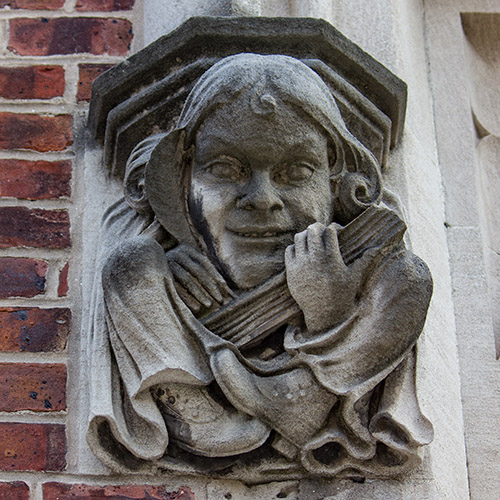
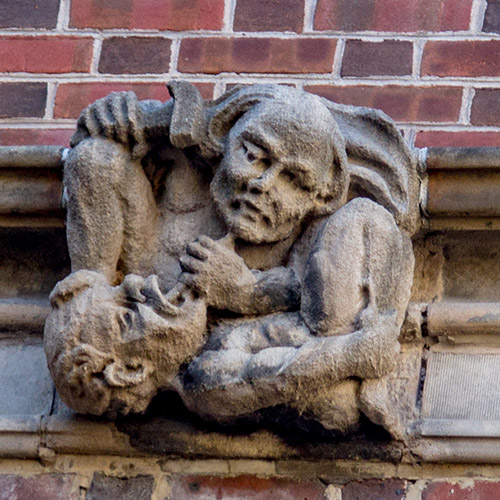
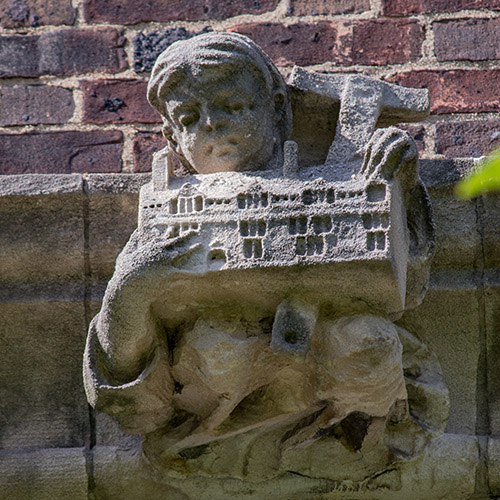
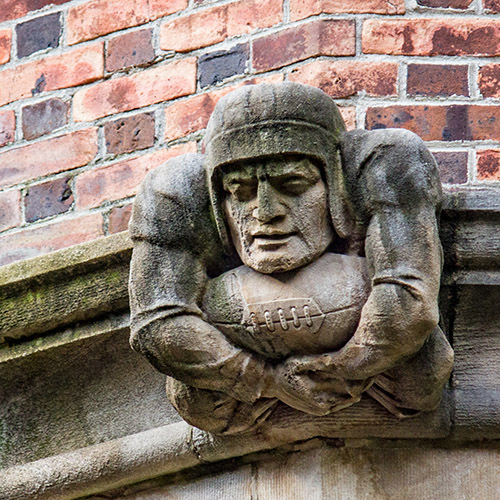

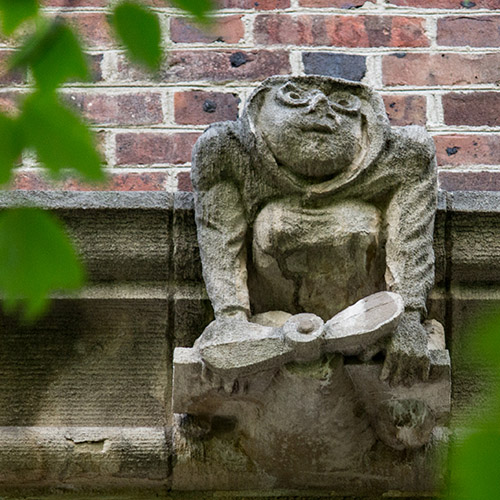
![caption: This trio, who adorn a corner on the Quad exterior, hold aloft a P (for Penn) and the University’s motto from 1898 to 1932, Literae Sine Moribus Vanae (letters without morals [are] useless). Today’s motto is slightly different. The owl, a symbol of wisdom, is a common motif throughout Penn’s gargoyles and bosses.](/uploads/img/Quad_Exterior-3.jpg)
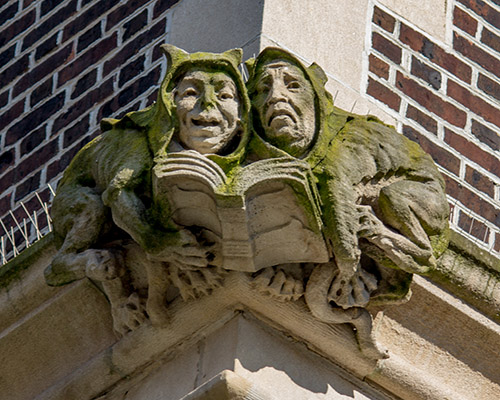
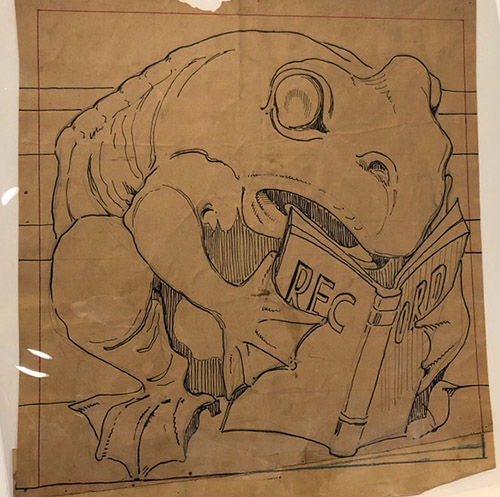
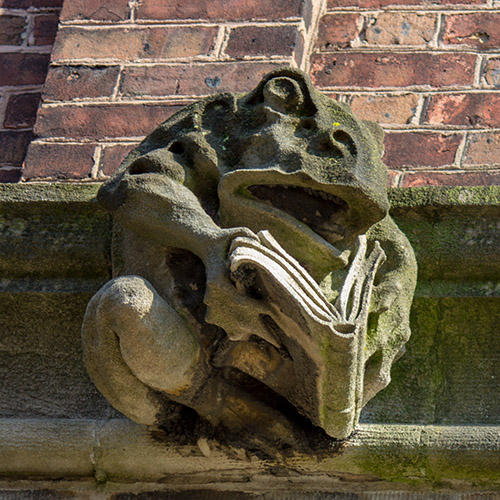

After More Than 40 years, Almanac’s Dedicated Leader to Retire
Lauren Hertzler
 Marguerite Miller reflects on her long tenure at Penn, reminiscing on a time of running the publication before voicemail messages, before computers, and before the internet existed.
Marguerite Miller reflects on her long tenure at Penn, reminiscing on a time of running the publication before voicemail messages, before computers, and before the internet existed.
Ms. Miller’s landing at Almanac as a temp employee in 1980 was a bit serendipitous, but the work she has done since is nothing short of pure passion.
“It was in my blood early on that I liked this sort of thing,” Ms. Miller says, chatting about her high school and college days involved with the student newspaper and yearbook.
Throughout the years, Ms. Miller has covered countless events. Almanac, which touts itself as the University’s “journal of record,” will say goodbye to its longtime editor and advocate at the end of the semester, when Ms. Miller retires after a truly impactful tenure at Penn.
“As a faithful reporter on important moments and milestones in Penn’s history for four decades, Marguerite has illuminated and contextualized transformative changes on campus,” says Joann Mitchell, who, as Senior Vice President for Institutional Affairs, oversees the weekly publication. “Under her leadership, Almanac has a well-earned reputation of service that can be relied upon to provide news with fidelity and integrity.”
Ms. Miller celebrated her 40 years at Penn at a February Employee Recognition event hosted by President Amy Gutmann.
In loyal Miller fashion, she was actually slated to retire at the end of this past spring semester, at the height of COVID-19’s shock. But her dedication, especially amidst a worldwide pandemic, has ensured the publication’s success even during the most tumultuous of times.
Almanac, which morphed out of a monthly faculty-run newsletter, began its stretch as a weekly for faculty and staff early in the ’70s during Martin Meyerson’s presidency. A time similar to now—with misinformation and discontent writ large—Meyerson wanted to create a publication that showcased timely, credible, and reliable news and policies related to Penn, which also allowed for the right of reply and open expression. Almanac’s first editor of the weekly publication was Karen Gaines, who Ms. Miller still considers a mentor and friend. Ms. Gaines trained Ms. Miller as an assistant editor and later as an associate editor, and the two worked together for close to two decades before Ms. Gaines’ retirement in 1999. A nationwide search for Almanac’s successor landed right at home a year later: Ms. Miller became Almanac’s editor in 2000.
“While I waited to go in to speak with President [Judith] Rodin for my interview, I composed my thoughts and rubbed the foot of the Benjamin Franklin statue outside of College Hall,” says Ms. Miller, explaining the tale of how doing so “makes your wishes come true much faster.”
“I think Penn is part of Marguerite’s DNA at this point,” says Louise Emerick, Almanac’s associate editor. Look no further than Ms. Miller’s very own license plate. She calls her car the “Almanacmobile.”
When Ms. Miller, who first joined Almanac’s staff on a whim while her husband was attending graduate school at Penn, reflects on the past 40 years, she can’t help but become nostalgic. She tells stories about each of the four Penn presidents—and one interim president—she’s worked under, and can recall each and every building on campus Almanac’s staff has worked out of. She remembers how Almanac operated—“it was a lot of hurrying up and waiting”—before voicemail messages, before computers, and before the internet existed. She also reminisces on what it was like to be a working mother, raising her two children while keeping the publication afloat.
“Until I could find child care, I came back to the office after my maternity leave with baby and diapers and the whole shebang,” Ms. Miller says, remarking that she could “type and nurse and answer the phone at the same time.”
Touting her experience as a “family affair,” Ms. Miller notes how it’s been a pleasure to watch her children “grow up at Penn.” Her daughter, Roberta, now an alumna of Penn’s Graduate School of Education, and son, Andrew, would not only accompany their mother to the office on occasion, but they’d also enjoy summer camps every year at Penn, attend memorable Annenberg Center events together, and so much more. As her children moved up and on, Ms. Miller has stayed extremely active on campus, whether by taking classes on occasion and attending Human Resources’ wellness events for staff (her favorite was yoga), to serving on boards and executive committees of several University organizations, including the MLK Commemorative Symposium Executive Planning Committee and the University Club Board of Governors.
Ms. Miller remembers fondly her first time meeting Henry Daniell, a Penn professor of biochemistry, whose research at the Pennovation Center involves growing plants to treat and prevent disease.
“I think Penn is part of Marguerite’s DNA at this point,” says Louise Emerick, Almanac’s associate editor. “It’s a significant part of her identity in a very proud and good way. Whether she’s going to see talks, looking at sculptures on campus, or attending gallery exhibits, she gets involved in every piece of Penn and she loves it.”
Being in the know, of course, is a requirement of any Almanac editor. So has evolving with technology throughout the years. Almanac, before COVID-19, still existed as a print edition, but, for the past 23 years, has also been published online, with a weekly email newsletter sent out to its faculty, staff, trustee, overseer, emeritus faculty, retired staff, student, and alumni readers. More accessible than ever before, the publication serves as a way to keep folks abreast of new information, whether it involves coverage of Penn’s key governance components, new policies and programs, and annual reports, as well big donations, major hires, and honors and obituaries. In effect, Almanac is also an extremely important archive for researchers.
“It’s been an incredible journey, which is probably why it hasn’t seemed like so many years in the same place,” Ms. Miller says. “The ways we do things have evolved so dramatically. I think of President [Amy] Gutmann’s ‘Three R’s’: resourcefulness, resilience, and responsiveness. I love alliteration but it also resonated with me because those three words I could easily use to describe what we’ve had to do all these decades at Almanac.”
With a team of only three—Ms. Miller, Ms. Emerick, and web editor Alisha George—Almanac has always welcomed the wonderful assistance of the University’s work study students, some who served Almanac all four years of their Penn education. Ms. Miller estimates she has supervised at least 100 students, many of whom she’s still in touch with.
Ms. Emerick says one of her favorite things about Ms. Miller is her endearing love of birthdays. Work-study student or full-time staffer alike, without fail, Ms. Miller puts together cards and adds the special event to calendars.
“She even gives me presents for my kids on their birthdays,” Ms. Emerick says with a laugh. “She just loves personal connections; they are so important to her.”
When Ms. Miller talks about retirement, she notes how much she cares about Almanac and its future.
“She’s definitely Almanac’s strongest advocate,” says Ms. Emerick. “Almanac has stayed consistent because she fights for it, and she’ll prove its value to anyone who wants to know.”
Indeed, Ms. Miller says, “I’m not retiring because I don’t care anymore. I’m retiring because I almost feel that it is someone else’s turn.”
Looking ahead, Ms. Miller’s big plans for travel have been altered a bit, but she hopes to still be able to spend more time with family, especially her grandson, who just turned 1. She wants to continue to stay active and healthy, cook and bake, and read and write, too.
“It’s kind of an adventure, even though it’s not quite the one I imagined,” Ms. Miller says, noting her newfound interest in making bread from scratch.
As for Almanac, Ms. Emerick says its next leader will certainly have tough shoes to fill.
“The rolodex of information in Marguerite’s head—she has lived and breathed Almanac for so long—will be missed,” Ms. Emerick says. “We will definitely miss her dedication and ability to always pull it all together.”
 Gene therapy pioneer James Wilson, professor of medicine and director of the Gene Therapy Program and the Orphan Disease Center at Penn’s Perelman School of Medicine, and his team will work with Regeneron to study the safety and effectiveness of using AAV vectors to introduce the sequence of the cocktail’s virus-neutralizing antibodies directly to nasal epithelial cells. This new collaboration will introduce the application of AAVs, which have traditionally been used for gene therapies against deadly genetic diseases, to the fight against a virus that has infected more than 50 million people across the globe and taken the lives of 1.25 million to date.
Gene therapy pioneer James Wilson, professor of medicine and director of the Gene Therapy Program and the Orphan Disease Center at Penn’s Perelman School of Medicine, and his team will work with Regeneron to study the safety and effectiveness of using AAV vectors to introduce the sequence of the cocktail’s virus-neutralizing antibodies directly to nasal epithelial cells. This new collaboration will introduce the application of AAVs, which have traditionally been used for gene therapies against deadly genetic diseases, to the fight against a virus that has infected more than 50 million people across the globe and taken the lives of 1.25 million to date.
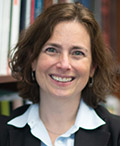 Kimberly Kessler Ferzan, L’95, has been named the Earle Hepburn Professor of Law and Co-Director of the Institute of Law & Philosophy at Penn’s Carey Law School. She will teach Criminal Law, Evidence, and a seminar on the theory and practice of criminal law. She is co-Editor-in-Chief of the journal Law and Philosophy and serves on the editorial boards of Legal Theory, Criminal Law and Philosophy, the Stanford Encyclopedia of Philosophy, and Oxford Studies in Political Philosophy. She was elected to the American Law Institute in 2015.
Kimberly Kessler Ferzan, L’95, has been named the Earle Hepburn Professor of Law and Co-Director of the Institute of Law & Philosophy at Penn’s Carey Law School. She will teach Criminal Law, Evidence, and a seminar on the theory and practice of criminal law. She is co-Editor-in-Chief of the journal Law and Philosophy and serves on the editorial boards of Legal Theory, Criminal Law and Philosophy, the Stanford Encyclopedia of Philosophy, and Oxford Studies in Political Philosophy. She was elected to the American Law Institute in 2015. Karen Tani, L’07 GR’11, is the Seaman Family University Professor and holds a joint appointment with the department of history in the School of Arts and Sciences. She is the University of Pennsylvania’s 24th Penn Integrates Knowledge University Professor. Dr. Tani is co-teaching a 1L elective course on Law and Inequality with Presidential Assistant Professor of Law Shaun Ossei-Owusu.
Karen Tani, L’07 GR’11, is the Seaman Family University Professor and holds a joint appointment with the department of history in the School of Arts and Sciences. She is the University of Pennsylvania’s 24th Penn Integrates Knowledge University Professor. Dr. Tani is co-teaching a 1L elective course on Law and Inequality with Presidential Assistant Professor of Law Shaun Ossei-Owusu.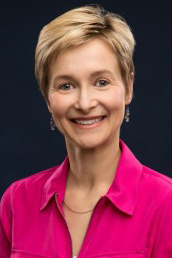 Dr. Kral is professor of nutrition science and associate program director of the Graduate Nutrition Certificate, with a secondary appointment as professor in the department of psychiatry at the Perelman School of Medicine. One of many multi-disciplinary faculty in the Penn Nursing family, she is a nutrition scientist with training in the study of human ingestive behavior. Her research focuses on the cognitive, sensory, and nutritional controls of appetite and eating in children and adults and their relevance to obesity. In predominantly minority children from low-resource environments, Dr. Kral studies protective factors within families for mitigating behavioral and socioeconomic risk factors for obesity development.
Dr. Kral is professor of nutrition science and associate program director of the Graduate Nutrition Certificate, with a secondary appointment as professor in the department of psychiatry at the Perelman School of Medicine. One of many multi-disciplinary faculty in the Penn Nursing family, she is a nutrition scientist with training in the study of human ingestive behavior. Her research focuses on the cognitive, sensory, and nutritional controls of appetite and eating in children and adults and their relevance to obesity. In predominantly minority children from low-resource environments, Dr. Kral studies protective factors within families for mitigating behavioral and socioeconomic risk factors for obesity development. Dr. Liu is professor of nursing, co-director of the Global Health Minor at Penn Nursing, and the Associate Editor of Research in Nursing and Health. She uses her training in maternal-child nursing, environmental health, and psychology to explore early health factors that affect children and adolescent’s cognitive and emotional/behavioral development. Her research integrates population-based epidemiological analyses with laboratory tests of cognition and psychophysiology to understand the mechanisms driving behaviors and emotions. As director of the NIH-funded China Jintan Child Health Project, Dr. Liu is following more than 1,000 children in Jintan city, China from pre-school into adolescence to understand the influence of exposure to environmental lead, nutrition, and psychosocial factors on their behavior. She mentors and advises doctoral, graduate, and undergraduate nursing students as well as students studying across multiple majors, including medicine, public health, education, business, engineering, and visiting scholars from China.
Dr. Liu is professor of nursing, co-director of the Global Health Minor at Penn Nursing, and the Associate Editor of Research in Nursing and Health. She uses her training in maternal-child nursing, environmental health, and psychology to explore early health factors that affect children and adolescent’s cognitive and emotional/behavioral development. Her research integrates population-based epidemiological analyses with laboratory tests of cognition and psychophysiology to understand the mechanisms driving behaviors and emotions. As director of the NIH-funded China Jintan Child Health Project, Dr. Liu is following more than 1,000 children in Jintan city, China from pre-school into adolescence to understand the influence of exposure to environmental lead, nutrition, and psychosocial factors on their behavior. She mentors and advises doctoral, graduate, and undergraduate nursing students as well as students studying across multiple majors, including medicine, public health, education, business, engineering, and visiting scholars from China.

 Nancy A. Hodgson, the Anthony Buividas Term Chair in Gerontology and professor of nursing, will be the next chair of the University of Pennsylvania School of Nursing’s (Penn Nursing) department of biobehavioral health sciences (BHS), effective January 1, 2021.
Nancy A. Hodgson, the Anthony Buividas Term Chair in Gerontology and professor of nursing, will be the next chair of the University of Pennsylvania School of Nursing’s (Penn Nursing) department of biobehavioral health sciences (BHS), effective January 1, 2021..png) Saul Katzman, former executive director of administrative affairs in Penn’s School of Arts and Sciences, died December 6 from complications from COVID-19. He was 73.
Saul Katzman, former executive director of administrative affairs in Penn’s School of Arts and Sciences, died December 6 from complications from COVID-19. He was 73.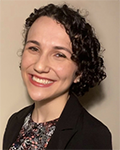
 University of Pennsylvania senior Annah Chollet and May graduate Yareqzy (Yary) Munoz have been named Marshall Scholars. Established by the British government, the Marshall Scholarship funds up to three years of study for a graduate degree in any field at an institution in the United Kingdom.
University of Pennsylvania senior Annah Chollet and May graduate Yareqzy (Yary) Munoz have been named Marshall Scholars. Established by the British government, the Marshall Scholarship funds up to three years of study for a graduate degree in any field at an institution in the United Kingdom.
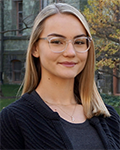

 University of Pennsylvania seniors Cristina Pogorevici, Paulina Ruta, and Yixi (Cecilia) Wang and 2019 graduate Annie Sun have received the Schwarzman Scholarship, which funds a one-year master’s degree in global affairs at Tsinghua University in Beijing.
University of Pennsylvania seniors Cristina Pogorevici, Paulina Ruta, and Yixi (Cecilia) Wang and 2019 graduate Annie Sun have received the Schwarzman Scholarship, which funds a one-year master’s degree in global affairs at Tsinghua University in Beijing. Ingo Helbig, a pediatric neurologist in the Division of Neurology at Children’s Hospital of Philadelphia (CHOP), director of the genomic and data science core of the CHOP Epilepsy Neurogenetics Initiative (ENGIN), and assistant professor of neurology and pediatrics at the Perelman School of Medicine at the University of Pennsylvania, has been named a recipient of a 2019 Hartwell Individual Biomedical Research Award.
Ingo Helbig, a pediatric neurologist in the Division of Neurology at Children’s Hospital of Philadelphia (CHOP), director of the genomic and data science core of the CHOP Epilepsy Neurogenetics Initiative (ENGIN), and assistant professor of neurology and pediatrics at the Perelman School of Medicine at the University of Pennsylvania, has been named a recipient of a 2019 Hartwell Individual Biomedical Research Award. Mary Mazzola, associate dean of enrollment management and global outreach at Penn’s School of Social Policy & Practice (SP2), has been named as the recipient of the National Deans & Directors of Social Work Admissions (NDDSWA)’s 2020 Years of Service award.
Mary Mazzola, associate dean of enrollment management and global outreach at Penn’s School of Social Policy & Practice (SP2), has been named as the recipient of the National Deans & Directors of Social Work Admissions (NDDSWA)’s 2020 Years of Service award. Penn Medicine’s E. Michael Ostap and Qi Long have been named 2020 Fellows of the American Association for the Advancement of Science (AAAS) for their distinguished efforts toward advancing science and maintaining the highest standards of professional ethics and scientific integrity. This year, 489 AAAS members have been selected as fellows by their peers for their “scientifically or socially distinguished efforts to advance science or its applications.”
Penn Medicine’s E. Michael Ostap and Qi Long have been named 2020 Fellows of the American Association for the Advancement of Science (AAAS) for their distinguished efforts toward advancing science and maintaining the highest standards of professional ethics and scientific integrity. This year, 489 AAAS members have been selected as fellows by their peers for their “scientifically or socially distinguished efforts to advance science or its applications.” Qi Long, professor of biostatistics in the department of biostatistics, epidemiology and informatics, director of the Center for Cancer Data Science, and associate director for cancer informatics of the Penn Institute for Biomedical Informatics, is being honored for his contributions to analysis of incomplete data, causal inference, and analysis of big data for advancing precision health. In addition to being named a Fellow of the AAAS, Dr. Long is an elected fellow of the American Statistical Association and an elected member of the International Statistical Institute.
Qi Long, professor of biostatistics in the department of biostatistics, epidemiology and informatics, director of the Center for Cancer Data Science, and associate director for cancer informatics of the Penn Institute for Biomedical Informatics, is being honored for his contributions to analysis of incomplete data, causal inference, and analysis of big data for advancing precision health. In addition to being named a Fellow of the AAAS, Dr. Long is an elected fellow of the American Statistical Association and an elected member of the International Statistical Institute. Dean W. Richardson, Chief of Large Animal Surgery at the University of Pennsylvania’s School of Veterinary Medicine’s (Penn Vet) New Bolton Center, has been selected as the recipient of the American College of Veterinary Surgeons’ (ACVS) prestigious Founders’ Award for Career Achievement. The recognition was first announced during the virtual ACVS Diplomates’ Annual Business Meeting held on October 20, 2020.
Dean W. Richardson, Chief of Large Animal Surgery at the University of Pennsylvania’s School of Veterinary Medicine’s (Penn Vet) New Bolton Center, has been selected as the recipient of the American College of Veterinary Surgeons’ (ACVS) prestigious Founders’ Award for Career Achievement. The recognition was first announced during the virtual ACVS Diplomates’ Annual Business Meeting held on October 20, 2020.










![caption: This trio, who adorn a corner on the Quad exterior, hold aloft a P (for Penn) and the University’s motto from 1898 to 1932, Literae Sine Moribus Vanae (letters without morals [are] useless). Today’s motto is slightly different. The owl, a symbol of wisdom, is a common motif throughout Penn’s gargoyles and bosses.](/uploads/img/Quad_Exterior-3.jpg)




 Marguerite Miller reflects on her long tenure at Penn, reminiscing on a time of running the publication before voicemail messages, before computers, and before the internet existed.
Marguerite Miller reflects on her long tenure at Penn, reminiscing on a time of running the publication before voicemail messages, before computers, and before the internet existed.